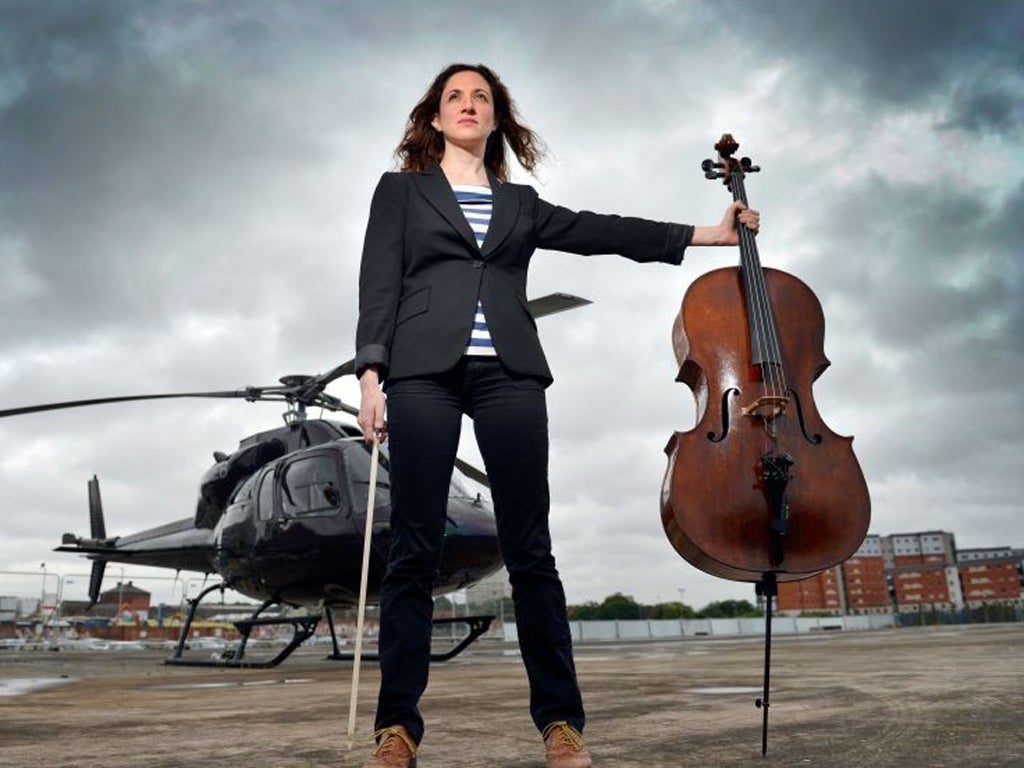Mittwoch aus Licht, Argyle Works, Birmingham
You wait for years for a helicopter and then... four come along at once, in Birmingham as in Edinburgh. What a whirl!

Your support helps us to tell the story
From reproductive rights to climate change to Big Tech, The Independent is on the ground when the story is developing. Whether it's investigating the financials of Elon Musk's pro-Trump PAC or producing our latest documentary, 'The A Word', which shines a light on the American women fighting for reproductive rights, we know how important it is to parse out the facts from the messaging.
At such a critical moment in US history, we need reporters on the ground. Your donation allows us to keep sending journalists to speak to both sides of the story.
The Independent is trusted by Americans across the entire political spectrum. And unlike many other quality news outlets, we choose not to lock Americans out of our reporting and analysis with paywalls. We believe quality journalism should be available to everyone, paid for by those who can afford it.
Your support makes all the difference.Lips puckered as though for a kiss, the sweet-tempered Bactrian camels in the yard of the Argyle Works set the tone for the world premiere of Karlheinz Stockhausen's Mittwoch aus Licht. Devotees of director Graham Vick's work with Birmingham Opera Company in the city's disused factories, banks and ice-rinks know the virtue of camel-like obedience: walk, sit, lie down, trust, observe, engage. Thus 500 people placidly picked their way through the concrete gloom of a former chemical works, positioned themselves on camping stools, stowed their bags under their legs for take-off, and waited for the lights to go down.
This was Birmingham's week:from the fecund gurgle of Hieronymus Bosch's fantasy world in Birmingham Contemporary Music Group's premiere of Simon Bainbridges's The Garden of Earthly Delights to Andris Nelsons' incendiary account of Shostakovich's Leningrad Symphony with the CBSO, both at the BBC Proms.
Mittwoch, composed between 1995 and 1997, is the last of Stockhausen's seven-day cycle of operas to be staged complete: a six-hour sequence of tableaux for instruments, voices and electronica celebrating creation, love, receptivity, clairvoyance, language (real and invented), and yellow. Performed piecemeal in Munich, Stuttgart, Amsterdam, Salzburg and Cologne, the work in full is a cosmic dream to dwarf those of earthbound Wagner. "Helicopter String Quartet", the fourth and most famous tableau (see Clifford Bishop, facing page), is the least of it. Whatever advantages Wagner enjoyed in terms of developing a coherent musical narrative, the Ring cycle does not feature a dancing camel that defecates seven planets.
In Vick's unhurried, ecstatic promenade production, Stockhausen's dream was realised wittily and lovingly. In the pitch-black softness of "Wednesday Greeting", Kathinka Pasveer's electronic prelude pulsed from speaker to speaker, now insectlike, now metallic, now a babble of repeated sung syllables – "Mi! Mi! Mi!" – the timbres diverting, the juxtapositions of pitch banal. Actors, kite-runners and dancers were lit briefly in the darkness. Upturned umbrellas became receivers for messages from outer space. Women processed with distended, pregnant bellies. A naked figure showered with a watering-can. One girl released a white balloon, another stood under a branch of forsythia.
Stockhausen's music became more substantive and startling as the audience moved into a second space where Vick's actors were joined by the 36 singers of Ex Cathedra for the polychoral, polyglot a capella congress of "World Parliament". Perched on yellow umpire seats, their faces painted the colours of flags, the singers blurted, crooned, kissed, hissed and growled a surround-sound space-age motet: now a drone of basses, now a coloratura cadenza, now imprecatory, now celebratory in duet, trio, quartet, octet or double-chorus, conducted first by the tenor President (Ben Thapa), then by his soprano successor (Elizabeth Drury).
In "Orchestra Finalists" we basked in perpetual summer on blue mats, as instrumentalists swung 10, 20 feet above. Fragmentary toccatas from clarinet, violin, bassoon, trumpet and flute were greeted by mutton-whiskered industrialists in smoking stove-pipe hats, a waving Russian cosmonaut, squealing gulls, falling confetti. A trombonist splashed in a paddling pool, answered by the yodelling and extreme spiccato of a zoot-suited double-bassist. If Stockhausen's horn-writing alludes to Mahler's Third Symphony, the result is more demotic, less pastoral.
"Helicopter String Quartet" is an anticlimax: too proscriptive for directorial interpretation and musically dull – a chain of dopplerised chromatics played in the air, relayed on four screens and framed by a Q&A session between DJ Nihal and the Elysian Quartet. London Voices replaced Ex Cathedra in the loopy denouement of "Michaelion", as the pantomime ungulate Lucicamel enjoys a pedicure, drinks champagne, shits planets, squashes a trombonist and unzips to reveal the Operator (bass Michael Leibundgut), a final blast of madrigalian folly before the submarine hum of Pasveer's electronic "Wednesday Farewell". Only a composer born on Sirius, as Stockhausen claims he was, could create this. Only Vick and the extraordinary Birmingham Opera Company could have brought it to life.
Critic's Choice
Scottish Opera's new and newish one-act operas, Craig Armstrong's The Lady from the Sea, James MacMillan's Clemency, Huw Watkins's In the Locked Room and Stuart MacRae's Ghost Patrol, open in Edinburgh (Wed). Simon Rattle and the Berliner Phil breeze into the BBC Proms with a shiversome programme including Sibelius and Ravel (Thu) and a Brahms/Lutoslawski double-decker, Royal Albert Hall, London (Fri).
Join our commenting forum
Join thought-provoking conversations, follow other Independent readers and see their replies
Comments